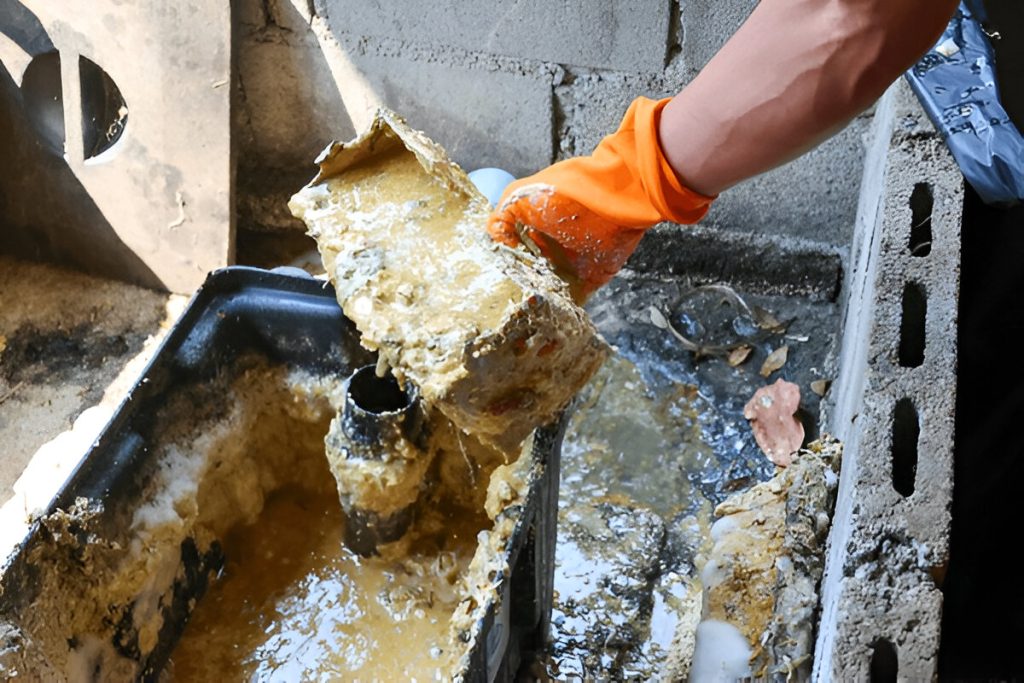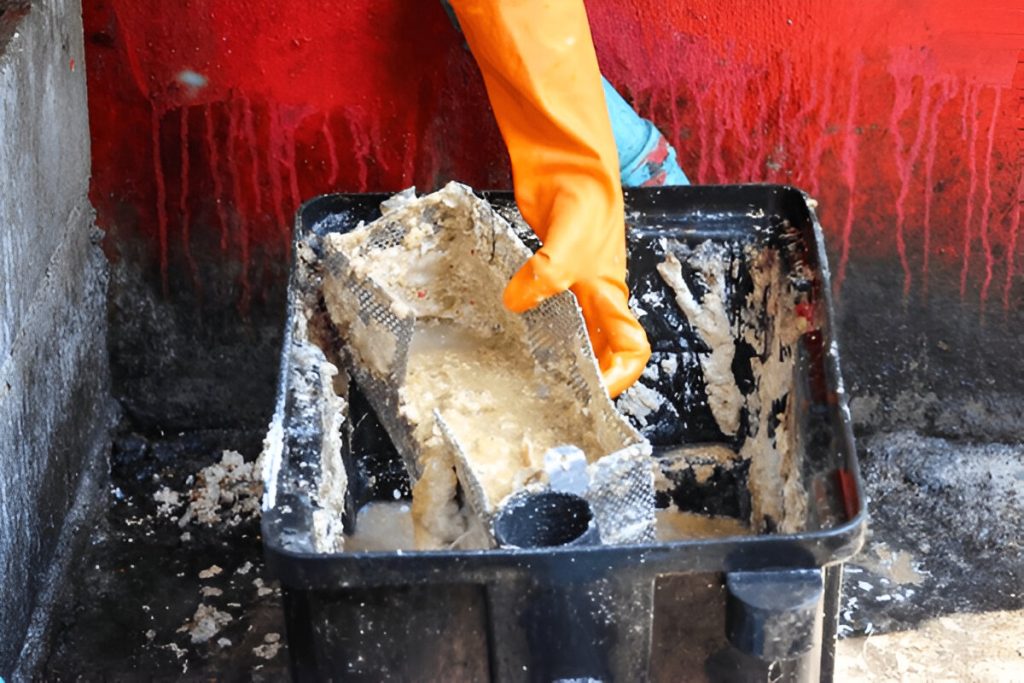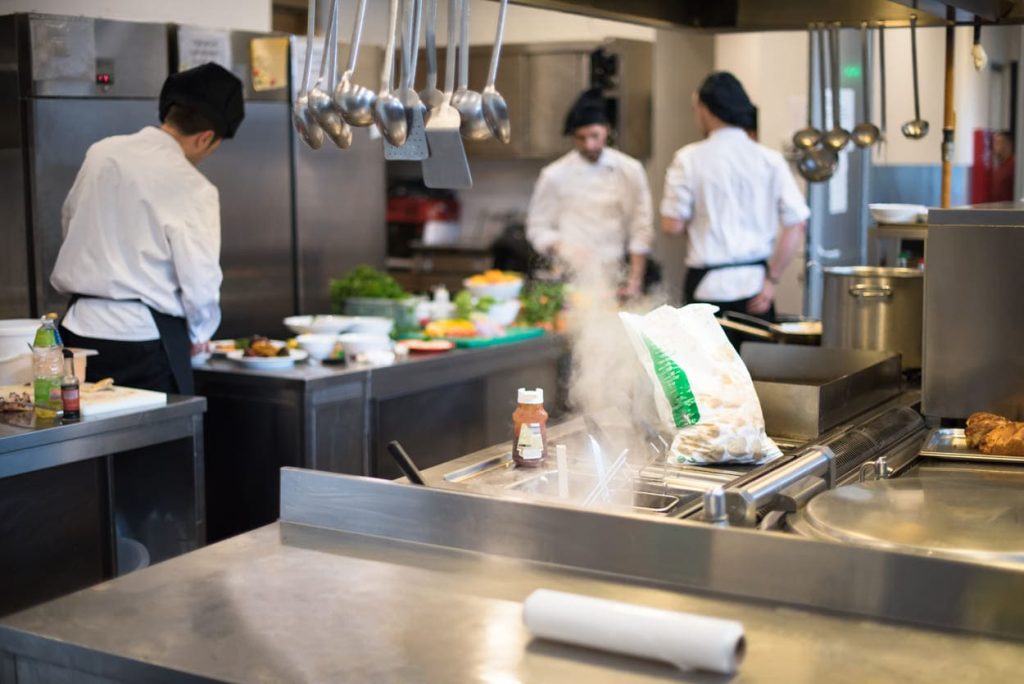Chicago Hood Cleaning
Grease Trap Cleaning in Robbins, IL
Rated 5 stars on Google

Tired of Grease Trap Trouble? Here's What We Help You Avoid
Grease traps can cause big problems when they aren’t cleaned regularly. These are the top problems our grease trap cleaning service can solve.
Foul Smells in Your Kitchen
Full grease traps bring nasty smells. If your kitchen has a constant odor, it might be coming from a full or clogged grease trap.
Slow or Stopped Drains
When a grease trap is too full, it can block your pipes. This causes sinks to drain slowly—or worse, flood.
Health Department Issues
Grease trap problems can lead to health code violations. A full grease trap can cause costly fines from health inspectors.
Grease Spills into Your Kitchen
Overflowing grease traps lead to dangerous, slippery floors. It’s not just dirty—it’s a safety hazard.
Higher Plumbing Costs
Grease buildup leads to clogs in your main line. Fixing that can be costly.
Unhappy Staff or Customers
Dirty grease traps can make your kitchen a less pleasant place to work or dine. A clean grease trap improves kitchen safety and the overall work atmosphere.
Why Choose Us for Vent Hood Cleaning in Robbins

Experienced Professionals
We’ve been in the business for years, offering expert grease trap cleaning services. Our team is highly trained to handle grease buildup and prevent common kitchen issues, ensuring your kitchen stays clean and operational.

Health Code
Compliant
We ensure your grease traps are up to code. Regular cleaning prevents violations and fines, so you can avoid costly problems and keep your kitchen in top shape for health inspections.

Prompt and Reliable Service
We understand the importance of keeping your kitchen running smoothly. That's why we offer fast, reliable grease trap cleaning services that won’t disrupt your business. We'll work around your schedule to minimize downtime.

Don't Let a Dirty Grease Trap Slow Down Your Robbins Kitchen
Running a successful kitchen requires keeping everything in check. A hidden kitchen problem is your grease trap. Ignoring grease trap maintenance can lead to big headaches.
What is Grease Trap Cleaning?
Grease trap cleaning involves removing the buildup of grease and food waste from your kitchen’s grease trap. Grease trap cleaning keeps your kitchen flowing smoothly and meets health codes.
Why Grease Trap Cleaning is So Powerful
Neglecting grease trap cleaning can lead to bigger issues that impact the safety and cleanliness of your kitchen. Regular cleaning helps avoid costly repairs and ensures your kitchen meets health and safety standards.
Top Problems Solved by Grease Trap Cleaning in Robbins
When you don’t clean your grease trap, it can lead to several problems:
Foul Kitchen Smells – A full grease trap produces foul odors that can fill your kitchen and spill out into your restaurant.
Backed-Up Drains – A clogged grease trap can cause your drains to slow down or back up.
Health Department Issues – Inspectors check grease traps, and neglecting it can lead to violations. A clogged or overflowing trap could lead to fines or a failed inspection.
Overflowing Grease Traps – When a trap overflows, it can send grease into your floors or drains. That’s messy, dangerous, and hard to clean.
Expensive Plumbing Repairs – Grease traps cause plumbing issues when left unchecked. A neglected grease trap can result in costly plumbing repairs.
Unpleasant Environment – A greasy kitchen is unappealing to both staff and customers. Cleaning your grease trap ensures a healthier, safer, and more pleasant work environment.
Keep Your Kitchen Clean and Safe
Our professional grease trap cleaning service in Robbins helps you avoid these issues and keep your kitchen in top condition. We clean your entire system, ensuring your business is safe, compliant, and ready for anything. Contact us for hassle-free, professional grease trap cleaning!

We Proudly Serve in Robbins
Located in Cook County, Illinois, Robbins is a community with a rich history and plenty to offer its residents. Originally established in the 1830s, Robbins grew as a railroad town and eventually became an incorporated village in 1917. Today, Robbins is known for its strong sense of community and diverse population, making it a great place to call home.
One of the reasons why Robbins is a great place to live is because of its close-knit community and small-town charm. Residents enjoy a peaceful suburban lifestyle while still having access to the amenities of nearby cities. The town also boasts beautiful parks, recreational facilities, and a thriving local economy.
Some of the city’s highlights include the Robbins History Museum, which showcases the town’s past through exhibits and artifacts. Residents and visitors alike can also enjoy the Robbins Park District’s programs and events, as well as the local restaurants and shops that give the town its unique character.
We would like to extend our thanks to the residents of Robbins for their continued support and business throughout the years. As a grease trap cleaning contractor, we look forward to serving the community and maintaining a clean environment for our customers.
Frequently Asked Questions
Grease trap cleaning is the process of removing built-up grease, food particles, and waste from your grease trap. This helps keep your kitchen’s plumbing system running smoothly, prevents bad odors, and ensures that your business is up to code.
The frequency of cleaning depends on the size of your kitchen and how much grease is used. Generally, it’s recommended to clean your grease trap every 1-3 months. Regular cleaning prevents overflow and keeps your kitchen running efficiently.
Regular grease trap cleaning prevents costly plumbing problems, bad odors, and health code violations. It also helps your kitchen stay sanitary and safe for both employees and customers. A clean grease trap ensures your business operates smoothly.
Neglecting grease trap cleaning can lead to foul odors, slow or clogged drains, plumbing backups, and even health code violations. It can also create an unhygienic environment, affecting both staff and customers.
The cleaning process typically takes 1-2 hours, depending on the size and condition of the grease trap. We work efficiently to minimize downtime for your kitchen and ensure everything is cleaned properly.
The cost of cleaning your grease trap varies based on the size and condition of the trap. However, regular cleaning is more affordable than dealing with plumbing repairs, health code violations, or a broken-down kitchen.
While it’s possible to clean your grease trap yourself, it’s best left to professionals. Our team has the experience and equipment to safely and thoroughly clean your grease trap, ensuring it’s done right and meets all local codes.
